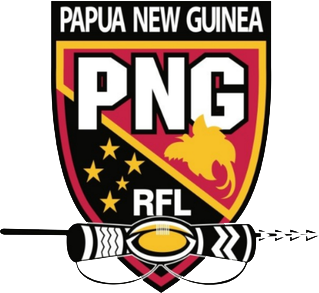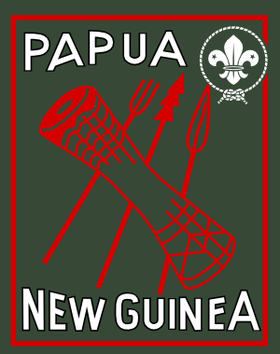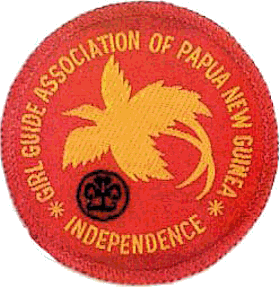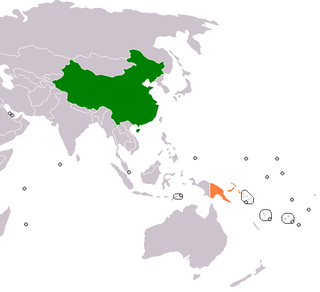
Papua New Guinea, officially the Independent State of Papua New Guinea, is a country in Oceania that comprises the eastern half of the island of New Guinea and its offshore islands in Melanesia. It shares its only land border with Indonesia to the west and its other close neighbours are Australia to the south and the Solomon Islands to the east. Its capital, located on its southern coast, is Port Moresby. The country is the world's third largest island country, with an area of 462,840 km2 (178,700 sq mi).

The politics of Papua New Guinea takes place in a framework of a parliamentary representative democratic multi-party system, whereby the prime minister is the head of government. Papua New Guinea is an independent Commonwealth realm, with the monarch serving as head of state and a governor-general, nominated by the National Parliament, serving as their representative. Executive power is exercised by the government. Legislative power is vested in both the government and parliament.

Port Moresby, also referred to as Pom City or simply Moresby, is the capital and largest city of Papua New Guinea. It is one of the largest cities in the southwestern Pacific outside of Australia and New Zealand. It is located on the shores of the Gulf of Papua, on the south-western coast of the Papuan Peninsula of the island of New Guinea. The city emerged as a trade centre in the second half of the 19th century. During World War II, it was a prime objective for conquest by the Imperial Japanese forces during 1942–43 as a staging point and air base to cut off Australia from Southeast Asia and the Americas. Due to its population and outsized influence compared to other cities in Papua New Guinea, Port Moresby may be regarded as a primate city.

The flag of Papua New Guinea was adopted on 1 July 1971. In the hoist, it depicts the Southern Cross; in the fly, a Raggiana bird-of-paradise is silhouetted. The design was chosen through a nationwide design competition in early 1971. The winning designer was Susan Karike, who was 15 at the time.

For administrative purposes, Papua New Guinea is divided into administrative divisions called provinces. There are 22 provincial-level divisions, which include 20 provinces, the Autonomous Region of Bougainville, and the National Capital District of Port Moresby.

The Papua New Guinea national rugby league team represents Papua New Guinea in the sport of rugby league football.

Religion in Papua New Guinea is dominated by various branches of Christianity, with traditional animism and ancestor worship often occurring less openly as another layer underneath or more openly side by side with Christianity. The Catholic Church has a plurality of the population. The courts, government, and general society uphold a constitutional right to freedom of speech, thought, and beliefs. A secular state, there is no state religion in the country, although the government openly partners with several Christian groups to provide services, and churches participate in local government bodies.
Sir John Douglas Guise was a Papua New Guinean politician who served as the first governor-general of Papua New Guinea after the country's independence from Australia in 1975. Prior to the independence itself, Guise was a vocal advocate for a peaceful secession from Australia.

The Scout Association of Papua New Guinea is a Scouting organisation in Papua New Guinea. It had its origins in 1926 as a branch of The Boy Scouts Association of the United Kingdom. It claimed an unaudited membership of 6,284 in 2011.
The Catholic Church in Papua New Guinea is part of the worldwide Catholic Church, under the spiritual leadership of the Pope in Rome. Papua New Guinea has approximately two million Catholic adherents, approximately 27% of the country's total population.

Papua New Guinea together with the West Papua region of Indonesia make up a major tropical wilderness area that still contains 5% of the original and untouched tropical high-biodiversity terrestrial ecosystems. PNG in itself contains over 5% of the world's biodiversity in less than 1% of the world's total land area. The flora of New Guinea is unique because it has two sources of origin; the Gondwana flora from the south and flora with Asian origin from the west. As a result, New Guinea shares major family and genera with Australia and the East Asia, but is rich in local endemic species. The endemicity is a result of mountainous isolation, topographic and soil habitat heterogeneity, high forest disturbance rates and abundant aseasonal rainfall year round. PNG boasts some 15–21,000 higher plants, 3,000 species of orchids, 800 species of coral, 600 species of fish, 250 species of mammals and 760 species of birds and 8 species of tree-kangaroos out of which 84 genera of animals are endemic. Ecosystems range from lowland forests to montane forests, alpine flora down to coastal areas which contains some of the most extensive pristine mangrove areas in the world. Much of this biodiversity has remained intact for thousands of years because the ruggedness of the terrain made the interior lands inaccessible; furthermore low population density and restrictions on the effectiveness of traditional tools, ensured that these biodiversity was never overexploited.

The Girl Guides Association of Papua New Guinea is the Guiding organisation in Papua New Guinea. Founded in 1927, the girls-only organization became a full member of the World Association of Girl Guides and Girl Scouts in 1978. It has 1,224 members.

Sir Michael Thomas Somare was a Papua New Guinean politician. Widely called the "father of the nation", he was the first Prime Minister after independence. At the time of his death, Somare was also the longest-serving prime minister, having been in office for 17 years over three separate terms: from 1975 to 1980; from 1982 to 1985; and from 2002 to 2011. His political career spanned from 1968 until his retirement in 2017. Besides serving as PM, he was minister of foreign affairs, leader of the opposition and governor of East Sepik Province.

Dame Alice Wedega, DBE was a Papuan politician, educator, peacemaker and conscientious objector.

Foreign relations exist between Australia and Papua New Guinea. Papua New Guinea is Australia's closest neighbour and a former colony of Australia. Both nations share the same continent in the Oceania region. Papua New Guinea has developed much closer relations with Australia than with Indonesia, the only country which it shares a land border with. The two countries are Commonwealth realms. In contemporary times, Papua New Guinea is one of the largest recipients of Australian aid. Some critics have pointed to instances where this has led to an outsized Australian influence on Papua New Guinea politics.

The monarchy of Papua New Guinea is a system of government in which a hereditary monarch is the sovereign and head of state of Papua New Guinea. The current Papua New Guinean monarch and head of state, since 8 September 2022, is King Charles III. As sovereign, he is the personal embodiment of the Papua New Guinean Crown. Although the person of the sovereign is equally shared with 14 other independent countries within the Commonwealth of Nations, each country's monarchy is separate and legally distinct. As a result, the current monarch is officially titled King of Papua New Guinea and, in this capacity, he and other members of the royal family undertake public and private functions domestically and abroad as representatives of Papua New Guinea. However, the King is the only member of the royal family with any constitutional role.

Chinese people in Papua New Guinea included, as of 2008, only about 1,000 of the "old Chinese"—locally born descendants of late 19th- and early 20th-century immigrants—remain in the country; most have moved to Australia. However, their numbers have been bolstered significantly by new arrivals from overseas Chinese communities in Southeast Asia and later from mainland China. There are also a few migrants from the Republic of China (Taiwan).
Capital punishment is no longer a legal punishment in the Independent State of Papua New Guinea.
Examples of Gender inequality Papua New Guinea includes poverty, violence, limited access to education and health care, and witch hunts. Cases of violence against women in PNG are under reported. There is also a lack of services for women who experience violence. There are reports of sexual abuse by police officers, on arrest and whilst in police custody. These incidents lack documentation or investigation, consequently, perpetrators are rarely prosecuted or punished. The government of Papua New Guinea (PNG) has introduced legislation to combat these issues, though with limited success.
The Papua New Guinea National Research Institute is a public policy and development research institute in Papua New Guinea. After independence it was established as an independent statutory authority by Act of Parliament. It absorbing other institutes in 1988, and took its current name in 1993.












